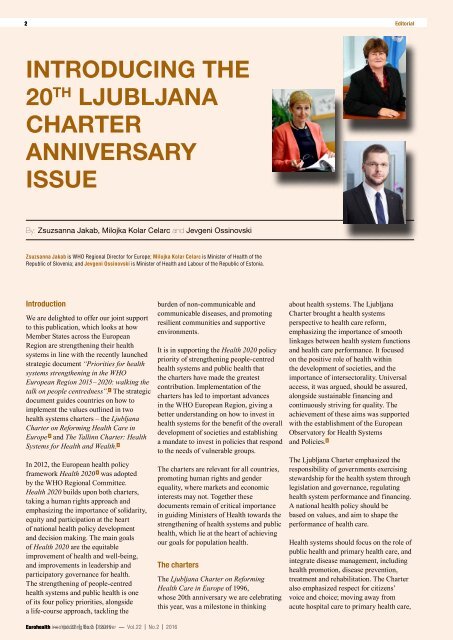EUROHEALTH
Eurohealth-volume22-number2-2016
Eurohealth-volume22-number2-2016
Create successful ePaper yourself
Turn your PDF publications into a flip-book with our unique Google optimized e-Paper software.
2<br />
Editorial<br />
INTRODUCING THE<br />
20 TH LJUBLJANA<br />
CHARTER<br />
ANNIVERSARY<br />
ISSUE<br />
By: Zsuzsanna Jakab, Milojka Kolar Celarc and Jevgeni Ossinovski<br />
Zsuzsanna Jakab is WHO Regional Director for Europe; Milojka Kolar Celarc is Minister of Health of the<br />
Republic of Slovenia; and Jevgeni Ossinovski is Minister of Health and Labour of the Republic of Estonia.<br />
Introduction<br />
We are delighted to offer our joint support<br />
to this publication, which looks at how<br />
Member States across the European<br />
Region are strengthening their health<br />
systems in line with the recently launched<br />
strategic document “Priorities for health<br />
systems strengthening in the WHO<br />
European Region 2015 – 2020: walking the<br />
talk on people centredness”. 1 The strategic<br />
document guides countries on how to<br />
implement the values outlined in two<br />
health systems charters – the Ljubljana<br />
Charter on Reforming Health Care in<br />
Europe 2 and The Tallinn Charter: Health<br />
Systems for Health and Wealth. 3<br />
In 2012, the European health policy<br />
framework Health 2020 4 was adopted<br />
by the WHO Regional Committee.<br />
Health 2020 builds upon both charters,<br />
taking a human rights approach and<br />
emphasizing the importance of solidarity,<br />
equity and participation at the heart<br />
of national health policy development<br />
and decision making. The main goals<br />
of Health 2020 are the equitable<br />
improvement of health and well-being,<br />
and improvements in leadership and<br />
participatory governance for health.<br />
The strengthening of people-centred<br />
health systems and public health is one<br />
of its four policy priorities, alongside<br />
a life-course approach, tackling the<br />
burden of non-communicable and<br />
communicable diseases, and promoting<br />
resilient communities and supportive<br />
environments.<br />
It is in supporting the Health 2020 policy<br />
priority of strengthening people-centred<br />
health systems and public health that<br />
the charters have made the greatest<br />
contribution. Implementation of the<br />
charters has led to important advances<br />
in the WHO European Region, giving a<br />
better understanding on how to invest in<br />
health systems for the benefit of the overall<br />
development of societies and establishing<br />
a mandate to invest in policies that respond<br />
to the needs of vulnerable groups.<br />
The charters are relevant for all countries,<br />
promoting human rights and gender<br />
equality, where markets and economic<br />
interests may not. Together these<br />
documents remain of critical importance<br />
in guiding Ministers of Health towards the<br />
strengthening of health systems and public<br />
health, which lie at the heart of achieving<br />
our goals for population health.<br />
The charters<br />
The Ljubljana Charter on Reforming<br />
Health Care in Europe of 1996,<br />
whose 20th anniversary we are celebrating<br />
this year, was a milestone in thinking<br />
about health systems. The Ljubljana<br />
Charter brought a health systems<br />
perspective to health care reform,<br />
emphasizing the importance of smooth<br />
linkages between health system functions<br />
and health care performance. It focused<br />
on the positive role of health within<br />
the development of societies, and the<br />
importance of intersectorality. Universal<br />
access, it was argued, should be assured,<br />
alongside sustainable financing and<br />
continuously striving for quality. The<br />
achievement of these aims was supported<br />
with the establishment of the European<br />
Observatory for Health Systems<br />
and Policies. 5<br />
The Ljubljana Charter emphasized the<br />
responsibility of governments exercising<br />
stewardship for the health system through<br />
legislation and governance, regulating<br />
health system performance and financing.<br />
A national health policy should be<br />
based on values, and aim to shape the<br />
performance of health care.<br />
Health systems should focus on the role of<br />
public health and primary health care, and<br />
integrate disease management, including<br />
health promotion, disease prevention,<br />
treatment and rehabilitation. The Charter<br />
also emphasized respect for citizens’<br />
voice and choice; moving away from<br />
acute hospital care to primary health care,<br />
Eurohealth incorporating — Vol.22 | No.2 Euro Observer | 2016 — Vol.22 | No.2 | 2016
















